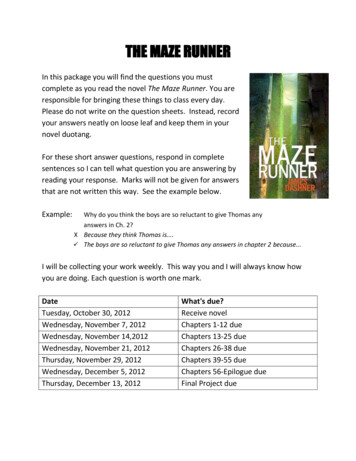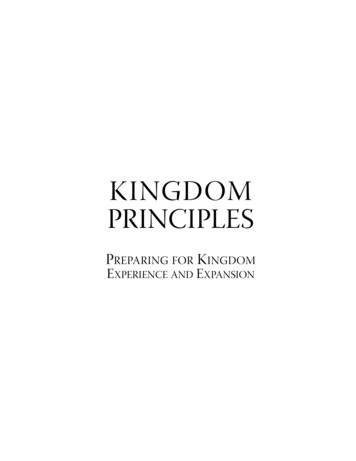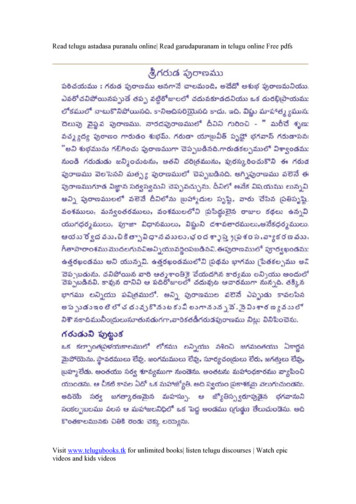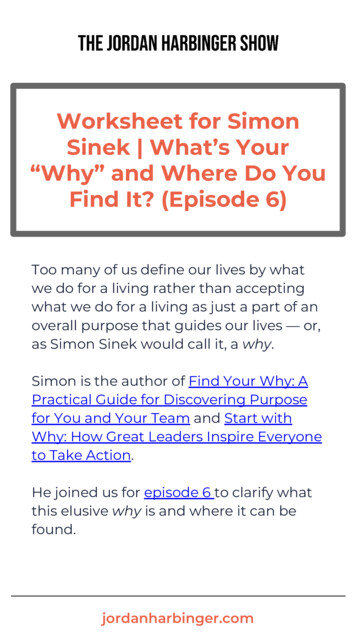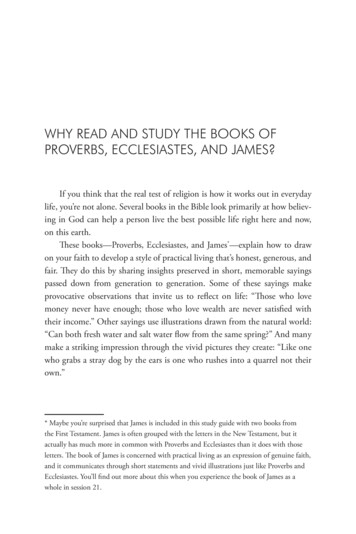
Transcription
WHY READ AND STUDY THE BOOKS OFPROVERBS, ECCLESIASTES, AND JAMES?If you think that the real test of religion is how it works out in everydaylife, you’re not alone. Several books in the Bible look primarily at how believing in God can help a person live the best possible life right here and now,on this earth.These books—Proverbs, Ecclesiastes, and James*—explain how to drawon your faith to develop a style of practical living that’s honest, generous, andfair. They do this by sharing insights preserved in short, memorable sayingspassed down from generation to generation. Some of these sayings makeprovocative observations that invite us to reflect on life: “Those who lovemoney never have enough; those who love wealth are never satisfied withtheir income.” Other sayings use illustrations drawn from the natural world:“Can both fresh water and salt water flow from the same spring?” And manymake a striking impression through the vivid pictures they create: “Like onewho grabs a stray dog by the ears is one who rushes into a quarrel not theirown.”* Maybe you’re surprised that James is included in this study guide with two books fromthe First Testament. James is often grouped with the letters in the New Testament, but itactually has much more in common with Proverbs and Ecclesiastes than it does with thoseletters. The book of James is concerned with practical living as an expression of genuine faith,and it communicates through short statements and vivid illustrations just like Proverbs andEcclesiastes. You’ll find out more about this when you experience the book of James as awhole in session 21.
For followers of Jesus, life in the age to come is going to be great—buthow about some life before death? If you want to see the impact that believingin God can have on your daily life right now, get together with some friendsand explore the timeless wisdom that these books have to share.UNDERSTANDING THEBOOKS OF THE BIBLEPROVERBS,ECCLESIASTES,and JAMES
Also available in theUnderstanding the Books of the Bible series:UNDERSTANDING THE BOOKS OF THE BIBLEJohnGenesisBiblical Apocalypses: Daniel/RevelationJoshua/Judges/Ruth—March arch 2011PROVERBS,ECCLESIASTES,and JAMESFuture releases:Exodus/Leviticus/NumbersNew Covenants: kielHaggai/Zechariah/Jonah/Joel/MalachiPsalms Books 1–3Psalms Books 4–5/Song of opher R. Smith
CONTENTSFOR LEADERSHow These Study Guides Are DifferentBiblica provides God’s Word to people through translation, publishing and Bible engagementin Africa, Asia Pacific, Europe, Latin American, Middle East, and North America. Through itsworldwide reach, Biblica engages people with God’s Word so that their lives are transformedthrough a relationship with Jesus Christ.SESSION 1PROVERBSThe Wise and Foolish Ways of Life1820 Jet Stream Drive, Colorado Springs, CO 80921 USAwww.Biblica.com13SESSION 2Everything You Do Flows from Your “Heart”Biblica PublishingWe welcome your questions and comments.116SESSION 3The “Heart” Expressed by How We Use Money and How We Speak21SESSION 4The “Heart” Expressed in Relationships and Reputation26SESSION 5What Brings the Content of the Heart out into Key Areas of Life30SESSION 6Understanding the Books of the Bible: Proverbs/Ecclesiastes/JamesISBN-13: 978-1-60657-056-2Copyright 2011 by Christopher R. Smith13 12 11 / 6 5 4 3 2 1Published in 2011 by Biblica, Inc. All rights reserved. No part of this book may be reproduced in any form without permission in writingfrom the publisher, except in the case of brief quotations embodied in articles or reviews.Scripture quotations are taken from the HOLY BIBLE, TODAY’S NEW INTERNATIONALVERSION TNIV . Copyright 2001, 2005 by Biblica, Inc. . Used by permission of Biblica, Inc. All rights reserved worldwide.A catalog record for this book is available through the Library of Congress.Printed in the United States of AmericaReceiving and Giving Correction34SESSION 7Character Qualities: The Fear of the Lord38SESSION 8Character Qualities: Humility42SESSION 9Character Qualities: Self-control45SESSION 10Character Qualities: Diligence (Hard Work)49SESSION 11Character Qualities: Dependability53SESSION 12Character Qualities: Caution (Prudence)57SESSION 13Character Qualities: Justice61SESSION 14Warnings Against Drunkenness and Sexual Immorality66SESSION 15Warnings Against Gangs and Putting Up Security70
SESSION 16ECCLESIASTESExperiencing the Book of Ecclesiastes as a WholeFOR LEADERS77SESSION 17Insights from Experience83SESSION 18Insights from Observation89SESSION 19The Practical Response to These Insights94SESSION 20Concluding Thoughts and Observations: “Remember Your Creator”SESSION 2198HOW THESE STUDY GUIDESARE DIFFERENTJAMESExperiencing the Book of James as a Whole107SESSION 22The Value of Trials111SESSION 23The Rich and the Poor from God’s Perspective116SESSION 24Keeping a Tight Rein on the Tongue120SESSION 25The Life that Flows from a New Heart124Did you know you could read and study the Bible without using anychapters or verses? The books of the Bible are real “books.” They’re meantto be experienced the same way other books are: as exciting, interestingworks that keep you turning pages right to the end and then make youwant to go back and savor each part. The Understanding the Booksof the Bible series of study guides will help you do that with the Bible.While you can use these guides with any version or translation, they’reespecially designed to be used with The Books of The Bible, an edition ofthe Scriptures from Biblica that takes out the chapter and verse numbersand presents the biblical books in their natural form. Here’s what peopleare saying about reading the Bible this way:I love it. I find myself understanding Scripture in a new way,with a fresh lens, and I feel spiritually refreshed as a result. Ilearn much more through stories being told, and with this newformat, I feel the truth of the story come alive for me.Reading Scripture this way flows beautifully. I don’t miss thechapter and verse numbers. I like them gone. They got in theway.1
I’ve been a reader of the Bible all of my life. But after reading justa few pages without chapters and verses, I was amazed at what I’dbeen missing all these years.For more information about The Books of The Bible or to obtain alow-cost copy, visit http://www.thebooksofthebible.info. Premium editions of this Bible will be available in Spring 2011 from Zondervan atyour favorite Christian retailer.For people who are used to chapters and verses, reading and studying the Bible without them may take a little getting used to. It’s likewhen you get a new cell phone or upgrade the operating system on yourcomputer. You have to unlearn some old ways of doing things and learnsome new ways. But it’s not too long until you catch on to how the newsystem works and you find you can do a lot of things you couldn’t dobefore.Here are some of the ways you and your group will have a betterexperience of the Scriptures by using these study guides.YOU’LL FOLLOW THE NATURAL FLOWOF BIBLICAL BOOKSThis guide will take you through the books of Proverbs, Ecclesiastes,and James following their natural flow. (The way these first two booksunfold is illustrated in the outlines on pages 11 and 82.) You won’t gochapter-by-chapter through these books, because chapter divisions in theBible often come at the wrong places and break up the flow. Did youknow that the chapter divisions used in most modern Bibles were addedmore than a thousand years after the biblical books were written? Andthat the verse numbers were added more than three centuries after that?If you grew up with the chapter-and-verse system, it may feel like part ofthe inspired Word of God. But it’s not. Those little numbers aren’t holy,and when you read and study Proverbs, Ecclesiastes, and James withoutthem, you’ll hear their message more clearly than ever before.2To help you get a feel for where you are in each book’s natural flow,the readings in Proverbs and the sessions in Ecclesiastes will be headed bya visual cue, like this:Book of Proverbs Sayings of AgurYOU’LL UNDERSTAND WHOLE BOOKSImagine going to a friend’s house to watch a movie you’ve never seenbefore. After only a couple of scenes, your friend stops the film and says,“So, tell me what you think of it so far.” When you give your best shotat a reply, based on the little you’ve seen, your friend says, “You know,there’s a scene in another movie that always makes me think of this one.”He switches to a different movie and before you know it, you’re watchinga scene from the middle of another film.Who would ever try to watch a movie this way? Yet many study guidestake this approach to the Bible. They have you read a few paragraphs fromone book, then jump to a passage in another book. The Understandingthe Books of the Bible series doesn’t do that. Instead, these studyguides focus on understanding the message and meaning of one bookat a time. Your group will read through the entire books of Proverbs,Ecclesiastes, and James, not just selected chapters or verses.Two of the sessions (session 16 and session 21) are overviews thatwill let you experience the books of Ecclesiastes and James as a whole, toprepare you for considering their individual sections. Reading throughan entire book at once will be like viewing a whole movie before zoomingin on one scene. Groups that read books of the Bible aloud togetherhave a great experience doing this. (If you’ve never done it before, giveit a try—you’ll be surprised at how well it flows and how fast the timepasses.) For these overview sessions, the discussion will be briefer anddesigned to allow people to share their overall impressions.The book of Proverbs has to be approached a bit differently. It’s acollection of originally independent sayings that are each meant to strike3
the hearer with freshness and immediacy. Reading through the entirecollection at once, without allowing for reflection and impact, dulls theedge of these sayings. So in the case of this book, it’s better to work upfrom the parts to the whole. You’ll read it a little at a time each week,noting the proverbs that speak immediately to your life, and as you goalong you’ll also explore and discuss the overall message of the book.But Proverbs actually begins with a series of longer speeches, words ofchallenge and encouragement spoken by parents to their children, thatset the tone for the whole book and introduce its themes. It’s helpful toread and discuss these all at once, and that’s what you’ll do in session 1.Note to group leaders: Each member should bring a Bible and a pencil, pen,highlighter, notebook, laptop, or some other means of noting meaningful individualsayings each week as you read and discuss the book of Proverbs. You may want tohave some extras available in case they’re needed.YOU’LL DECIDE FOR YOURSELVESWHAT TO DISCUSSIn each session of this study guide there are many options for discussion. While each session could be completed by a group in about an hourand a half, any one of the questions could lead to an involved conversation. There’s no need to cut the conversation short to try to “get throughit all.” As a group leader, you can read through all the questions ahead oftime and decide which one(s) to begin with, and what order to take themup in. If you do get into an involved discussion of one question, you canleave out some of the others, or you can extend the study over more thanone meeting if you do want to cover all of them.TOGETHER, YOU’LL TELL THE STORYEach session gives creative suggestions for reading the passage you’llbe discussing. If you’re using The Books of The Bible, you’ll find that thenatural sections it marks off by white space match up with the sections of4the reading. If you’re using another edition of the Bible, you’ll be able toidentify these sections easily because they’ll be indicated in this guide bytheir opening lines, or by some other means that makes them obvious.EVERYBODY WILL PARTICIPATEThere’s plenty of opportunity for everyone in the group to participate.Everyone can take turns reading the sayings from Proverbs, Ecclesiastes,and James that you’ll be considering. Group members can also readthe session introduction aloud or the discussion questions. As a leader,you can easily involve quiet people by giving them these opportunities.And everyone will feel that they can speak up and answer the questions,because they’re not looking for “right answers.” Instead, they invite thegroup to work together to understand the Bible.YOU’LL ALL SHARE DEEPLYThe discussion questions will invite you to share deeply about yourideas and experiences. The answers to these questions can’t be found justby “looking them up.” They require reflection on the meaning of eachsaying, in the wider context of the book it belongs to, in light of yourpersonal experience. These aren’t the kinds of abstract, academic questions that make the discussion feel like a test. Instead, they’ll connect theBible passage to your life in practical, personal, relational ways.To create a climate of trust where this kind of deep sharing is encouraged, here are a couple of ground rules that your group should agree toat its first meeting:Confidentiality. Group members agree to keep what is shared inthe group strictly confidential. “What’s said in the group staysin the group.”Respect. Group members will treat other members with respect atall times, even when disagreeing over ideas.5
HOW TO LEAD GROUP STUDIES USING THIS GUIDEEach session has three basic parts:Introduction to the StudyHave a member of your group read the introduction to the session outloud to everyone. Then give group members the chance to ask questionsabout the introduction and offer their own thoughts and examples.Reading from Proverbs, Ecclesiastes, and JamesRead the selection out loud together. (The study guide will offer suggestions for various ways you can do this for each session. For the bookof James, reading and discussion are combined.)Discussion QuestionsMost questions are introduced with some observations. These maygive some background to the history and culture of the ancient world, orexplain where you are in the flow of the book. After these observationsthere are suggested discussion questions. Many of them have multipleparts that are really just different ways of getting at an issue.You don’t have to discuss the questions in the order they appear inthe study guide. You can choose to spend your time exploring just one ortwo questions and not do the others. Or you can have a shorter discussionof each question so that you do cover all of them. As the group leader,before the meeting you should read the questions and the observationsthat introduce them, and decide which ones you want to emphasize.When you get to a given question, have someone read aloud theobservations and the question. As you answer the question, interact withthe observations (you can agree or disagree with them) in light of yourreading from the Bible. Use only part of the question to get at the issuefrom one angle, or use all of the parts, as you choose.6TIPS FOR HOME GROUPS, SUNDAY SCHOOLCLASSES, COMMUNITY BIBLE EXPERIENCES,AND INDIVIDUAL USEIf you’re using this guide in a home group, you may want to begineach meeting (or at least some meetings) by having dinner together. Youmay also want to have a time of singing and prayer before or after thestudy.If you’re using this guide in a Sunday school class, you may want tohave a time of singing and prayer before or after the study.This study guide can also be used in connection with a communityBible experience of the books of Proverbs, Ecclesiastes, and James. If you’reusing it in this way: Encourage people to read each session’s Scripture passageby themselves early in the week (except for sessions 1, 16,and 21, when the whole church will gather to hear theopening speeches in Proverbs and the books of Ecclesiastesand James read out loud). Do each session in midweek small groups. Invite people to write/create some response to eachsmall-group session that could be shared in worship thatweekend. These might involve poetry, journal or blogentries, artwork, dramas, videos, and so on. During the weekend worship services, let people sharethese responses, and have preaching on the topic of thesession that was studied that week. Speakers can gather upcomments they’ve heard from people and draw on their ownreflections to sum up the church’s experience of that session.This guide can also be used for individual study. You can write outyour responses to the questions in a notebook or journal. (However, wereally encourage reading and studying the Bible in community!)And on an official note, anytime you see italicized words in Scripturequotations in this book, the italics have been added for emphasis.7
PROVERBS8
COLLECTIONS OF SAYINGS INTHE BOOK OF PROVERBSOpening Speeches (12)The first speech is a prologue to the bookProverbs of Solomon (375)The value of the Hebrew letters in Solomon’s name is 375“Sayings of the Wise” (30)More “Sayings of the Wise” (5)Proverbs of Solomon“compiled by the men of Hezekiah” (130)The value of the Hebrew letters in Hezekiah’s name is 130The Sayings of AgurThe Sayings of King LemuelThe poem about a “wife of noble character” may be by another wise person11
SESSION 1THE WISE AND FOOLISH WAYS OF LIFEBook of Proverbs Opening SpeechesINTRODUCTIONThe book of Proverbs is made up of several collections of practicalsayings, passed down from generation to generation, that represent thedistilled wisdom of experience. (See the outline on page 11.) Solomon,the third king of Israel, was renowned for his wisdom, and he was an avidcollector and creator of proverbs. This book preserves over five hundredof his proverbs, as well as the sayings of other wise people of the ancientworld.Before the collections of sayings begin, the book of Proverbs presentsa series of speeches that praise the practical benefits a person can receiveby pursuing the wisdom that’s embodied in these sayings. These speechesmake up the first third of the book and set the tone for Proverbs as awhole by introducing its overall themes.Above all, the speeches establish a fundamental contrast betweenbeing “wise” and being “foolish.” These terms don’t refer to how intelligent or educated a person is. This is moral and spiritual language. The“wise” person always takes God into account when choosing a course of13
READINGHave the people in your group take turns reading the speeches at thebeginning of the Proverbs. This should take about 45 minutes. Listen forthe major themes these speeches develop, particularly the contrast between the “wise” and the “fool” and how their lives turn out differently.Whenever something strikes you with freshness and immediacy, andyou hear it speaking to your life today, mark it in some way. You mightwant to highlight or underline it in your Bible, or put a star next to itin the margin, or record it in a notebook or on a laptop computer. Asyou continue to note meaningful sayings week by week, you’ll build apersonal collection of proverbs that you can refer to as you apply thelarger themes of the book to your own life.In The Books of The Bible, the opening speeches in the book ofProverbs are on pages 1123–37. There are a couple of blank lines betweeneach speech.If you’re using another edition of the Bible, you can recognize themfrom their opening lines: “The proverbs of Solomon son of David” (This speech announces the book’s purpose.)“Listen, my son, to your father’s instruction . . .”“Out in the open wisdom calls aloud . . .”“My son, if you accept my words . . .”“My son, do not forget my teaching . . .”“Listen, my sons, to a father’s instruction . . .” (ending,“keep your foot from evil”)“My son, pay attention to my wisdom . . .”“My son, if you have put up security for your neighbor. . .”“My son, keep your father’s command . . .”“My son, keep my words and store up my commands . . .”“Does not wisdom call out? . . .”“Wisdom has built her house . . .” (ending just before theheading “The proverbs of Solomon”)The Wise and Foolish Ways of LifeThe Wise and Foolish Ways of Lifeaction. This way of proceeding is spoken of as the “fear of the Lord.”* Bycontrast, “fools” live without regard to God. They don’t necessarily denythat God exists; they just live as if God didn’t matter, and as if no one elsehad anything to teach them. These speeches describe in vivid detail howdifferently the life of a “fool” turns out from the life of a person who is“wise.”This session will get you into the book of Proverbs by taking youthrough the opening speeches that introduce its message and themes.(We’ll have occasion to revisit these speeches often as we trace the majorthemes of the book in the following sessions.)DISCUSSION What things struck you most as you listened to the openingspeeches in the book of Proverbs? If you’d like, share one ortwo of the statements you highlighted for yourself, and explainwhy they were meaningful for you. What’s the main advice that’s given in these speeches?How would you express it in your own words? Proverbs was written a long time ago, but its sayings aremeant to be timeless. What are some present-day examples ofthe kinds of things these speeches are talking about?* “Lord” written in large and small capital letters is a translation of the divine name“Yahweh.”1415
EVERYTHING YOU DO FLOWSFROM YOUR “HEART”Book of Proverbs Solomon’s ProverbsINTRODUCTIONAs you read through the book of Proverbs session by session, storing up its wisdom by recording and reflecting on individual statementsthat strike you, you’ll also be discussing its major themes and overallmessage.It won’t be possible to synchronize the reading and discussion exactlyfor each session. The sayings in the book of Proverbs aren’t organized bytopic; instead, within each of the collections in the book, observations ona variety of topics are all mixed together, so that each one can strike thehearer with fresh force. People who work through Proverbs collection bycollection, talking about whatever sayings they find most interesting, willcertainly have a lively and freewheeling discussion every time. But theywouldn’t necessarily appreciate the foundational message of the book andrecognize how this finds expression through its individual sayings.Another approach would be to consider the proverbs in topicalgroups. The book provides practical advice on a variety of subjects:work, money, friendship, marriage, sex, parenting, food, drink, health,speech, anger, crime, death, and so forth. However, there’s a danger in16approaching the book this way. It’s not providing practical advice thatjust anyone can follow to be happy and successful in life. At its deepestlevel, the book of Proverbs is trying to show us how to become the kind ofpeople who can live in the wise way it describes.This is the fundamental theme of the book, and we’ll begin exploringit in this session. In the sessions that follow we’ll continue this thematicapproach, drawing on proverbs from all over the book. Each time you’llread more of Proverbs and continue to mark and collect the sayings thatstrike you most. You’ll find that many of them will relate to the discussiontopics that are raised. And by the time you reach the end of the book insession 15, you should be able to see its full thematic message expressedin the sayings you’ve found most meaningful to your life right now.In this guide, it will only be possible to cite and discuss a smallpercentage of the proverbs in the book. These represent many others thatshed further light on the same areas of life, from complementary perspectives. Any one proverb could easily provide the basis of an entire evening’sdiscussion. But since a group that meets weekly would need well over adecade to go through the book that way, these representative proverbs areoffered to introduce you to the book and hopefully to generate a life-longinterest in its collection of provocative and empowering sayings.Everything You Do Flows From Your “Heart”SESSION 2READINGAfter the opening speeches, the book of Proverbs presents severalcollections of short sayings that express the wisdom of experience in aconcise and memorable way. The first collection is of 375 of Solomon’sproverbs. In Hebrew, letters were also used as numbers, and 375 is thetotal value of the letters in Solomon’s name. This is therefore a “signaturecollection” of some of his most insightful and telling observations aboutlife.Have the members of your group take turns reading the first 25 proverbs in this collection, ending with “When the storm has swept by, thewicked are gone, but the righteous stand firm forever.” After each proverb,pause briefly so that people can absorb its meaning and highlight it for17
DISCUSSIONThe foundational insight of the book of Proverbs is that each personhas a core of being, known as the “heart.” Everything a person thinks,says, and does flows out of this core. The sixth opening speech warns,“Above all else, guard your heart, for everything you do flows from it.”Towards the end of the book, in a later collection of Solomon’s proverbs,we’re told, “As water reflects the face, so one’s life reflects the heart.” Whowe truly are, deep inside, will inevitably come out in our words andactions.The problem is, our “heart” or core-of-being is so deep within usthat it’s difficult to understand. It’s hard for someone else to know: “Eachheart knows its own bitterness, and no one else can share its joy.” Ourown heart is even hard for us to know: “People may think all their waysare right, but the Lord weighs the heart.” This is why we may oftenfeel that we don’t really know who we are, and why we find ourselveswondering, “Why did I do that? How could I have said that?”But there’s hope. God, who knows the deepest secrets of the universe, can see into our hearts: “Death and destruction lie open before the18Lord—how much more do human hearts!” As a person lives in closerand closer relationship with God, and as they pray for understanding,God can show them what’s in their heart. And the more godly wisdomsomeone acquires, the more clearly they can see into the depths of people’shearts—including their own: “The purposes of the human heart are deepwaters, but those who have insight draw them out.”(If this topic is of particular interest to you, keep an eye out for themany other proverbs in the book that talk about the “heart.”) How well would you say you know yourself? Where wouldyou place yourself on a scale of 1 to 10, with 10 being deep,consistent, accurate self-knowledge, and 1 being the placewhere you often say, “I don’t think I really know who I am”?Everything You Do Flows From Your “Heart”Everything You Do Flows From Your “Heart”themselves if they wish. If anyone doesn’t understand one of the proverbs,they should say so, and the group as a whole can help explain it. (You’llread a larger number of proverbs in later sessions; this session is designedto get you started on reading, reflecting, and recording.)You might want to put a small mark, paper clip, or sticky notein your Bible at the place where you stopped reading, so that you caneasily find your starting place for the next session. This may be helpfulthroughout your study of Solomon’s proverbs, because there are so manyof them, with no natural breaks. (The traditional chapter numbers areartificial divisions, so to give you a sense of where the real breaks in thebook are, we’re ignoring chapter divisions and just reading collection bycollection.)At the end of the reading, let people mention one or two proverbsthat particularly struck them and explain how they spoke to their lives. If you feel comfortable doing so, share an experience, ifyou’ve had one recently, where you did or said something andthen immediately wondered why you had. Were you eventuallyable to figure out what led you to speak or act as you did? Who do you know who’s best able to help you understandwhat’s really going on inside you? What personal qualitiesmake them good at this? Conclude this session by praying together that God wouldreveal each of your own hearts to you. Begin by reading thisprayer from Psalm 139 together:Search me, God, and know my heart;test me and know my anxious thoughts.See if there is any offensive way in me,and lead me in the way everlasting.Then let anyone who wishes pray out loud. End by saying this ancientprayer together:19
Everything You Do Flows From Your “Heart”SESSION 3Most High, glorious God, enlighten the darkness of my heart,and give me right faith, certain hope, and perfect charity, wisdom and understanding, Lord, that I may carry out your holyand true command. Amen.THE “HEART” EXPRESSED BY HOW WE USEMONEY AND HOW WE SPEAKBook of Proverbs Solomon’s Proverbs, continuedINTRODUCTIONIn this session you’ll read more of the “signature collection” ofSolomon’s proverbs, and you’ll continue discussing Proverbs’ theme ofthe “heart” as the core of being.Most of the sayings in this collection are made up of two lines. Theselines work together in one of three basic ways:1. The second line may draw a contrast with the first: “Wise children bring joy to their father, but foolish children bring grief to theirmother.”2. The second line may repeat the meaning of the first line, to reinforce it: “Hopes placed in mortals die with them; all the promise oftheir power comes to nothing.” (Similarly, the two lines may be used tocreate a comparison: “As vinegar to the teeth and smoke to the eyes, soare sluggards to those who send them.”)3. The second line may add something to what the first line says:“The blessing of the Lord brings wealth, without
letters. The book of James is concerned with practical living as an expression of genuine faith, and it communicates through short statements and vivid illustrations just like Proverbs and Ecclesiastes. You’ll find out more abou

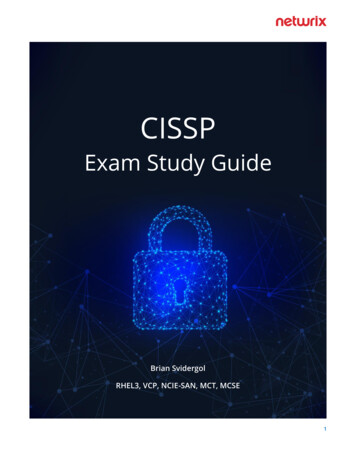


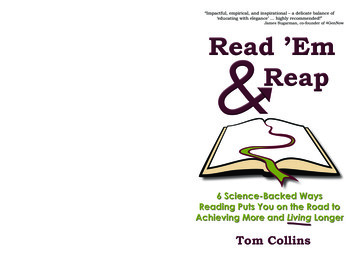
![[Page 1 – front cover] [Show cover CLEAN GET- AWAY 978-1 .](/img/13/9781984892973-6648.jpg)
